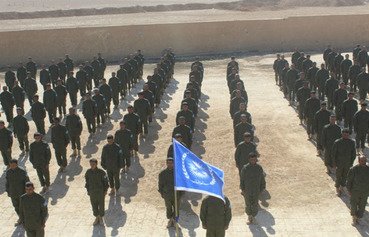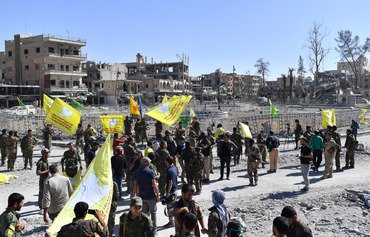The Syrian Democratic Forces (SDF) on Friday (October 20th) hailed a "historic victory" over the "Islamic State of Iraq and Syria" (ISIS) in al-Raqa city and vowed to hand over power to a civilian administration.
The Arab-Kurd opposition alliance held an official ceremony in the city's stadium three days after fully retaking al-Raqa, the heart of ISIS's "caliphate".
But the SDF stopped short of transferring authority to al-Raqa Civil Council, because it said much ordnance disposal remained to be done before the city could be left in civilian hands.
SDF spokesman Talal Sello, speaking in front of fighters and council members, said this week's victory against ISIS was dedicated to "all humanity".
At the ceremony, held in the stadium where on Tuesday ISIS fighters made their last stand in the city, Sello vowed the SDF would transfer power soon.
"After the end of clearing operations... we will hand over the city to al-Raqa Civil Council," he said.
Destruction on a massive scale
Sello stressed the SDF would maintain its presence in the area.
"The return of civilians to al-Raqa will not take place in any major way for many weeks, such is the quantity of explosive devices ISIS left behind," French military spokesman Patrik Steiger said.
Al-Raqa was heavily damaged during the battle, which the Syrian Observatory for Human Rights said left more than 3,200 dead, including 1,130 civilians.
Ahmed al-Ali, of al-Raqa Civil Council's reconstruction committee, expressed his shock at discovering the extent of the destruction before the ceremony.
"Today is the first time I have come to the city since its liberation," he said.
"I have not managed to get to my house on al-Qitar street," he added, breaking into tears and walking away.
One of his colleagues, Mahmud Mohamed, admitted that his idea of what reconstruction would entail changed the second he entered al-Raqa.
"When we came into the city, the plan changed completely," he said, adding that the condition of the city is "so much worse" than he had imagined.

![A woman cries as she looks at her house in al-Raqa on Friday (October 20th), after the Syrian Democratic Forces expelled the 'Islamic State of Iraq and Syria' from the city. [Bulent Kilic/AFP]](/cnmi_di/images/2017/10/20/10097-Raqa-woman-weeps-600_384.jpg)





